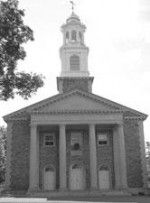A Different Type of “Heretic” on Campus

The word “heretic” evokes an immediate emotional response within individuals, a reaction associated with a typically negative connotation. The recent name change of Colgate’s “I’m Spiritual but Not Religious” Club to “The Heretics Club” has sparked the community’s interest in the meaning behind the new title; however, the nature of the club has not transformed, just gained more notoriety that will, ideally, attract a larger audience.
In spite of its pejorative name, the group is not about heretics, rather about questioning one’s faith and having the freedom to discuss religious ideas without dogma. President Rebecca Chopp’s interest in spirituality inspired Associate University Chaplain and Campus Protestant Minister Mark Mann to start the club. Her suggestion led the University’s three chaplain to initiate the group meetings.
The name “heretic” then came about while the three University Chaplains joked around at the beginning of the semester.
“Coming up with the name was accidental,” Mann said. “It was a joke and happened to stumble out.”
“Heretic” refers to an individual who rejects any article of faith, typically by a member of the Catholic Church, but Mann insists that the club does not promote anti-religious beliefs but rather offers an open environment for both religious and spiritual students to engage in a relaxed discussion.
“We create a safe place for people to do inquiry, religious exploration,” Mann said.
Mann believes that the most positive aspect of the club is its appeal to a large group of people, as it now involves a cross section of all religious groups on campus. Not only have new students become involved, the club has already seen interest from several religion professors.
“[Members] are people who care deeply about religion and spirituality but are on an off-beat path,” Mann said. “Many college students go through the same feelings as heretics in that they question their religion and spirituality.”
Mann says that it is a universal emotion for college students on their path to adulthood.
The Student Government Association (SGA) has not recognized the club, and will not until the members draft a constitution for approval.
“The goal is to have it as a separate organization, but it is not a great urgency right now,” University Chaplain and Catholic Campus Minister Mark Shiner said. “We are willing, but the primary reasons to get it recognized by SGA are for funding.”
Shiner said that when the club has a solid community, it will try to receive funding. Currently, around eight to ten students attend the luncheon meetings every Thursday at 12:10 p.m. to 1:20 p.m.
First-year Hannah Robinson has served as an integral member of the club, attending the meetings from the beginning of last semester.
“I thought it was a great way to get involved in the religious community,” Robinson said. “We engage in thoughtful discussion, and I really get a lot out of it. People that go really want to be there and are genuinely interested in what you have to say.”
Every other week the club features a speaker, usually from the Religion department. Associate University Chaplain and Director of Jewish Life Dave Levy spoke two weeks ago, which led to a discussion the week after about the meaning of the afterlife.
“This club is unique in that it creates a safe place to tackle big ticket issues that might be uncomfortable in a religious context,” Levy said. “Students inquire about issues they may normally feel inappropriate to ask during church or synagogue.”
The three chaplains lead the discussions and, as Levy said, they provide a level of expertise that they hope is valuable to the students.
The most impressive aspect of the club to Shiner is its originality.
“We invented our own thing,” Shiner said. As far as the chaplains know, no other college campus has the same group.






